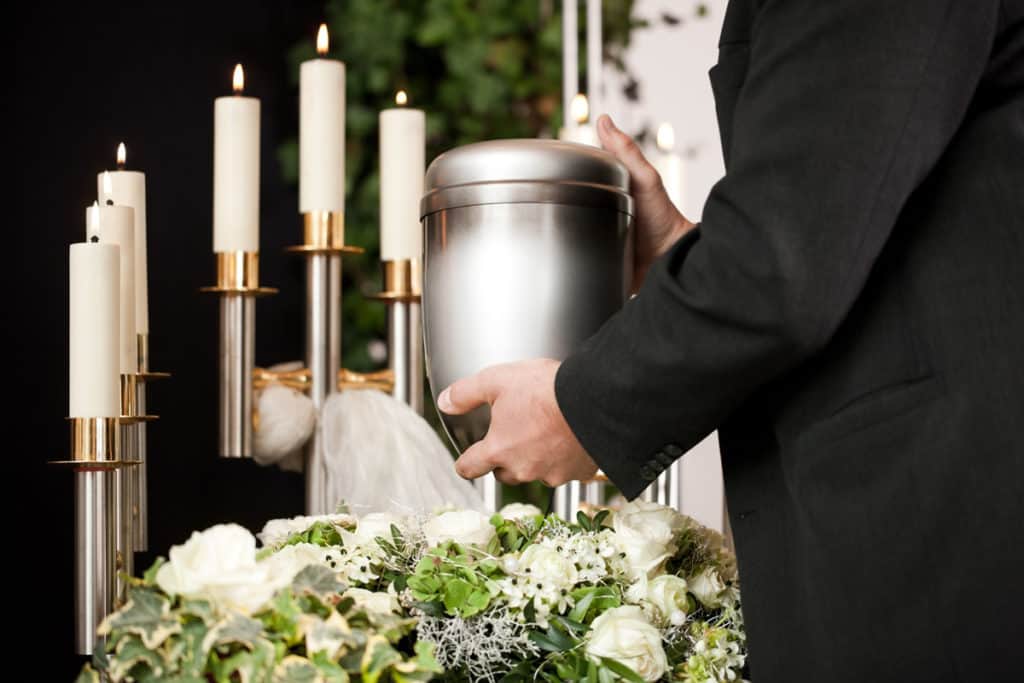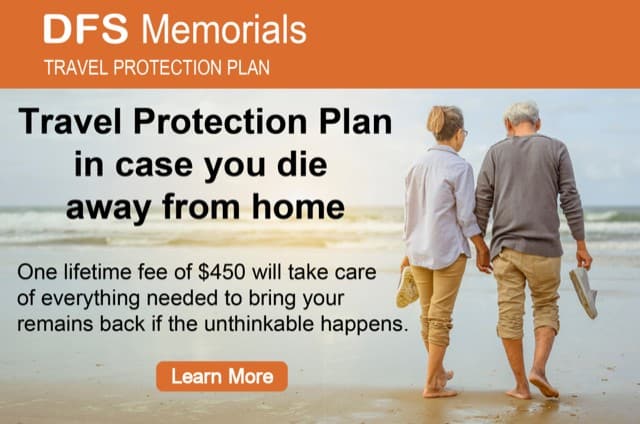Arranging a funeral or cremation in Pennsylvania
If you need to arrange a funeral or cremation in Pennsylvania or are researching to pre-plan a funeral, then this guide can help you. We have covered some of the main questions that you may have as you consider your options for a funeral or cremation. Such as what your consumer rights are, what costs you can expect, and what is legal with regard to Pennsylvania state law and licensing.
How do you choose which funeral home or cremation provider suits your needs?
Pennsylvania has some 1800 funeral homes, around 1000 cemeteries and memorial parks, and some 500 crematories. So, it can be quite a task to choose a funeral home or cremation provider. Most people usually consider recommendations from family, friends, or associates with prior experience arranging a funeral.
However, you may either have not had any recommendations or require something different. As people are shifting more towards cremation as a disposition option, this can often mean people are seeking out new service providers. Or, the cost has become such a significant aspect of death care these days that many need to shop around to compare prices between funeral homes.
Direct Cremation Philadelphia $1,095 Call (215) 310-0777
All funeral directors in Pennsylvania must be licensed, and the State Board of Funeral Directors regulates the licensure and practice of funeral directors. The State Board’s functions include formulating necessary rules and regulations for the proper conduct of the business or profession of funeral directing to safeguard the public’s interests and the profession’s standards. In addition, the Board fixes the time and place for the examination necessary to obtain a license and, through its authorized inspector, conducts inspections of funeral homes.
Direct Cremation Pittsburgh $695 Call (412) 203-5809
Pennsylvania does have some strange state laws when it comes to funeral practice. It is the only state where licensed funeral directors can only own funeral homes, and the funeral home’s name MUST be in the name of the licensed funeral director. An individual licensee can own no more than two funeral homes, and only licensed funeral homes can sell some funeral-related products. Funeral homes are also NOT allowed to serve food according to state law.
Direct Cremation Allentown $1,495 Call (610) 273-8022

How do I find a funeral home or cremation provider in Pennsylvania?
A directory of all the funeral homes in Pennsylvania is provided here on US Funerals Online, organized by state and city. We list ALL funeral providers for free on our directory. If you are specifically looking for a budget cremation provider, we would suggest you visit DFS Memorials.
DFS Memorials is a network of local, family-owned funeral homes and crematories that offer affordable options to their local communities and can provide direct cremation for an affordable price.
Firstly, it is advisable to ensure that you are dealing with a licensed funeral director. Funeral homes should display their licenses, or you can ask for their license number. All funeral establishments must provide you with a General Price List (GPL) when you make any inquiries regarding the cost of their services. A GPL must state an itemized breakdown of all services and merchandise.
This aligns with the federal law on the sale of funeral services and products. The funeral director must also provide you with a Casket Price List and a price list for burial vaults by law, plus disclose information about ‘cash advances.’
You must make these upfront payments for services or products that the funeral director contracts from a third party. Cash advances are usually such things as death certificates and other permits, funeral flowers, obituary notices & minister or celebrant services.
Do you want a burial or cremation?
This is probably the first thing you need to decide upon. Burial is still by far more common in Pennsylvania, with over 60% of funerals being burials. Across much of rural Pennsylvania, residents still opt to utilize family cemetery plots. However, our death care traditions are changing, and cremation is certainly becoming more popular. You obviously have to do what is right for your circumstances, taking into account the wishes of the deceased and such things as funds for funeral expenses, the location of the deceased, etc.
What is the cost of a funeral or cremation in Pennsylvania?
This is the million-dollar question that many people turn to search online to find out. Unfortunately, many in the funeral profession do not believe in disclosing their prices on their websites or advertising. The reason is that often, when you ask, “How much does a funeral cost” it can be synonymous with “How long is a piece of string?” …which really means, “How much can you afford to spend”?
It is fair to say that the cost of a funeral does vary significantly, even in the same area for equivalent services. For this reason, it is highly recommended that you shop around and compare costs.
DFS Memorials is a network of affordable cremation providers, all local family-owned funeral businesses, which guarantee to provide a basic direct cremation at a low cost. You should locate your nearest provider if you are simply looking for the cheapest option for arranging a funeral.
All DFS Memorials providers guarantee to offer a ‘best value’ direct cremation package. A direct cremation can be arranged in Pennsylvania for between $695 and $1,695 (depending on your location).
Can I conduct a ‘home funeral’ in Pennsylvania?
Yes, nothing in Pennsylvanian law states that you must use the services of a funeral director. However, if the family plans not to use a funeral director but wishes to remove the body through a family member, the Department of Health will instruct the hospital not to release the body until the family files the death certificate with a local registrar and returns to the hospital with the burial (disposition) permit in hand as evidence of the family’s having filed the death certificate.
This assumes the body is not dead of a contagious disease. It is common in rural parts of Pennsylvania for families to choose to coordinate their service and burial on a family cemetery plot.
Understanding Cremation in Pennsylvania
About 37,000 Pennsylvanians are currently cremated each year. Cremation is cheaper than a burial, which is why many are opting for it. A cremation with a service can be conducted just the same as a standard funeral service, with the body in repose, but then cremation is performed after the service instead of burial. This means no cemetery plot, burial vault, or casket is required. A casket is not required for cremation purposes, but a combustible cremation container is required.
Visit our Ultimate Guide to Cremation to read more about cremation services.
Many funeral homes will offer a rental casket for the purposes of a service or viewing. Direct cremation means the deceased is collected and transferred directly to the crematory. No service is conducted before the cremation.
However, the family can conduct a memorial service once the cremated remains are returned. This is the simplest and cheapest means of disposition today. Cremated remains can be buried in a cemetery plot or cremation garden, interred in a columbarium, kept at home, or scattered.
Pennsylvania has a mandatory 24-hour waiting period before a cremation can be performed. This is common practice across the U.S., although the period differs between 24 and 48 hours between states.
What are burial and cemetery plot requirements in Pennsylvania?
As mentioned above, you can bury your loved one on your private cemetery plot if you have one. Nothing in state law prohibits a burial on private, family property. The family should check with the local zoning or code enforcement officer. Apparently, Philadelphia and Pittsburgh have ordinances prohibiting human burials anywhere but in an established cemetery. If you require a cemetery burial plot in Pennsylvania, then it is recommended that you research in detail with the cemetery of your choice.
All cemeteries have their own policies regarding specific criteria for vaults, grave liners, and grave markers. Pennsylvania law does NOT require that a vault is needed or indeed a casket or coffin. The Federal Funeral law states that you do NOT have to purchase a casket from your funeral director, and your funeral director CAN NOT refuse to accept a casket purchased online.

Most cemeteries impose their own regulations as a standard to maintain their grounds. Vaults help to maintain the integrity of the burial plot, especially as the ground is subjected to extremes of heat and cold in the Pennsylvanian climate. The imposition by cemeteries can also be considered another aspect of the profitability of the death care industry.
There are many small family cemeteries across rural Pennsylvania, where a fence encases a small plot of land and holds the family entombments. If you are considering using private land as a family burial plot, do ensure that you consult lawyers so that the deeds are written such that the family can still gain access if ever the land is sold. Note: there are state laws governing the movement of interred remains.
Perpetual care is the maintenance of the cemetery, including the grounds, roads, and any buildings or mausoleums. It does not usually specifically include maintenance of monuments, so you should check what provision is in place for any ongoing care for grave markers, especially if any subsidence should occur.
Arranging a Green Funeral or Natural Burial
There is growing interest in green funeral alternatives today. There are a number of funeral homes offering green burial services and green cemeteries in PA. With rising environmental and climate change concerns, moving towards a more sustainable option for death care is paramount.
Check out our Guide to Arranging a Green Funeral in Pennsylvania and our Green Burial Directory to locate green cemeteries.

Can I pre-plan a funeral or cremation? How does Pennsylvania state law govern preneed plans?
Preplanning a funeral is a good way to save the surviving family from a funeral’s emotional and financial burden. These days it can also be a wise choice when the funds allotted to a funeral plan are not considered if you later require senior aid and are assessed.
In Pennsylvania, preneed contracts must be funded through a trust or escrow account, and only licensed funeral directors can sell preneed funeral contracts. Cemeterians can sell preneed goods.
Another alternative is to consult a funeral home, decide upon your needs, document your wishes, and set aside appropriate funds in a payable-on-death (POD) account or Totten Trust. This is where you identify a beneficiary who can draw the funds on your death without the need for probate. There are also a number of online resources now for documenting your wishes so that they are accessible by family when the need arises.
Is embalming required by law in Pennsylvania?
No, embalming is NOT required by law, although if the body is being transported out-of-state or out of the U.S., embalming may be required. Some entombment mausoleums may have stipulations about embalming. A funeral director may recommend embalming if a visitation is required prior to the funeral, and although embalming may help to delay decomposition, it does not prevent it completely.
If you do not want to have your loved one embalmed, no law stipulates it unless for public health reasons. Do not be pressured into embalming unless it is really required due to reasons for delaying the funeral or for viewing purposes.
What are my options for purchasing a casket or alternative container?
Fortunately, you can now purchase a casket from a third-party seller. This was brought about by the Federal Trade Commission’s (FTC) ‘Funeral Rule.’ It gives you the right, as a consumer, to be able to purchase a casket from a source other than your funeral home. This can significantly save you costs on your overall funeral expenses.
It used to be that the price for a standard casket from a funeral home could start at around $2,500, as funeral homes added a huge markup to the wholesale price. But now you can purchase a standard casket for as little as $995. We would advise you to ensure you are dealing with a reputable casket retailer. Most reputable dealers can ship a casket anywhere within the United States on next-day delivery.
Your funeral home has to accept your casket and cannot add a surcharge for handling it.
What are the laws for scattering ashes in Pennsylvania?
With the increase in cremation, ash scattering is becoming more popular, and yet many people are unsure of just what laws govern their right to scatter remains. Pennsylvania has some beautiful rural lands making it a wonderful place to conduct an ash scattering ceremony.
Cremated remains are considered sterile and organic in nature. In fact, the phosphates that make up part of cremains are actually natural fertilizers.
You can legally scatter remains on private land if you have the landowner’s permission. There are 120 state parks in Pennsylvania, and the scattering of ashes is permitted with Bureau approval. Individuals can pursue approval by discussing their intentions with the park manager of the state park site they are interested in. The park manager will need to know details such as time, date, process, and location as part of the approval process and may approve this activity provided there are no conflicts or operational issues.
Park approval may be verbal or in writing, and there is no charge for this approval. Ashes must be obtained after cremation by a legitimate funeral establishment. The relevant state park can be contacted at: http://www.dcnr.state.pa.us/stateparks/contactus/park/index.htm

What help is available with funeral expenses in Pennsylvania?
It is a sad reality in our world today that more and more people are finding themselves unable to pay for the cost of a funeral. There are benefits for veterans and their spouses to assist with a funeral. You should visit our section on veteran funerals for more information on this.
Social security does pay out $255 for those who have worked long enough and qualify, and most local Human Services will have some allowance to help those who are most needy and have no money to cover funeral costs. This will only be minimal assistance for the most basic of services.
What do you do if your loved one dies away from Pennsylvania?
These days with a more mobile population, deaths can commonly occur away from home. If a death occurs in another state, you will need to make arrangements to transport the body back to Pennsylvania. A funeral home at the place of death will need to assist you in collecting the body and preparing it for transportation. Another option is for a cremation to be conducted at the place of death, and the cremated remains then shipped home.
To learn more about what to do when a loved one dies away from home, visit our funeral shipping page.
If you do travel regularly for work, pleasure, sport, visiting family, or snow-birding, you may wish to consider our great value Travel Protection Plan. This plan costs just $450 for an individual for lifetime protection against the costly expense of returning a body home if a death occurs 75 miles (or further) from your residence in Pennsylvania. It also provides global coverage. Domestic funeral shipping can cost from $3,000, and International repatriation can start at around $6,900.
If you do travel regularly for work, pleasure, sport, visiting family, or snow-birding, you may wish to consider our great value Travel Protection Plan. This plan costs just $450 for an individual for lifetime protection against the costly expense of returning a body home if a death occurs 75 miles (or further) from your residence. It also provides global coverage. Domestic funeral shipping can cost from $3,000, and International repatriation can start at around $6,900.
Visit our article on Travel Protection: Your Guide to Affordable Funeral Shipping, or click on the link above to enroll today.
Are whole-body donations permitted in Pennsylvania?
Donating a body to science is growing as a new alternative end-of-life solution. If you are interested in an anatomical gift, further information about donating a body in Pennsylvania can be found on our Body Donation page.
Some Pennsylvania institutions accept body donations, but you need to check the details carefully. Some institutions charge for the donation process, and it can take some considerable time for cremated remains to be returned to the family.
What should you do if you have a complaint about funeral services or products you have purchased?
The State Board of Funeral Directors regulates the licensing of funeral directors in the Commonwealth of Pennsylvania. Suppose you have a complaint regarding the services or products you have purchased from a funeral director. In that case, you can make a written complaint to the Pennsylvania Funeral Directors Association’s Grievance Committee.
Grievance Committee c/o PFDA, 7441 Allentown Boulevard, Harrisburg, PA, 17112
Alternatively, you can also contact the Pennsylvania Cemetery Cremation and Funeral Association (PCCFA) which is the association of funeral directors, cemetery, and crematory businesses. They serve to support industry professionals and consumers in the sale and purchase of funeral services in the state.
Pennsylvania Cemetery Cremation and Funeral Association (PCCFA)
100 S. 21st Street, Harrisburg, PA 17104
Telephone: 717-236-9970
Funeral homes and cremation providers in the commonwealth of Pennsylvania serve the residents of Adams, Allegheny, Armstrong, Beaver, Bedford, Berks, Blair, Bradford, Bucks, Butler, Cambria, Cameron, Carbon, Centre, Chester, Clarion, Clearfield, Clinton, Columbia, Crawford, Cumberland, Dauphin, Delaware, Elk, Erie, Fayette, Forest, Franklin, Fulton, Greene, Huntingdon, Indiana, Jefferson, Juniata, Lackawanna, Lancaster, Lawrence, Lebanon, Lehigh, Luzerne, Lycoming, McKean, Mercer, Mifflin, Monroe, Montgomery, Montour, Northampton, Northumberland, Perry, Philadelphia, Pike, Potter, Schuylkill, Snyder, Somerset, Sullivan, Susquehanna, Tioga, Union, Venango, Warren, Washington, Wayne, Westmoreland, Wyoming, and York counties.
Related Articles:
- Understanding the FTC’s Funeral Rule and how it affects your rights when arranging a funeral
- Glossary of Funeral Terms: How to Understand the General Price List
- Understanding cremation laws and how they affect arranging a cremation
Resources:


